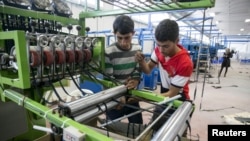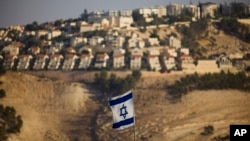The EU move to label products manufactured in West Bank settlements has no great economic impact, but according to experts it is sending a strong message from a major member of the group mediating the Israeli-Palestinian peace process.
Following a decision by the 28-country European Union in mid-November to clearly label farm goods and other products produced or manufactured in the occupied territories, Israeli Prime Minister Benjamin Netanyahu announced that Israel would suspend diplomatic contacts with the EU related to the Israeli-Palestinian peace process.
The EU is Israel’s top trading partner; annual commerce is valued at $32 billion. The EU move is predicted to lead to only a modest drop in trade, but according to Shibley Telhami, professor of peace and development at the University of Maryland, it is sending a strong message.
“That symbolism is important because it highlights the determination to see the settlement issue as a problem. Obviously if you start with a step, it becomes a slippery slope, so if it is not effective, then you do something more. The timing of it is probably a function of the absence of the peace process; the fact that the peace process has failed,” Telhami said.
European governments argue that lands seized by Israel in the 1967 war are not part of Israel’s internationally recognized borders.
Backfire potential
David Pollock, a fellow at the Washington Institute for Near East Policy, said the move could backfire.
“It would make it harder for the peace process to resume in a constructive way because the Israeli government will react very negatively, as it seems to be doing right now,” he said.
Pollock said the Israeli reaction also is symbolic, because Netanyahu indicated that contacts with France, Britain and Germany on the peace process will continue.
Khalil Jahshan, executive director of the Arab Center in Washington, says that from the very beginning, settlements were a major hurdle to the U.S.-sponsored two-state solution.
“Because how can you pursue a peace process based on the concept of exchanging land for peace when half of the formula is defunct; if there is no land to exchange for peace, then there is no peace," he said.
Jahshan added that while the U.S. official position has been that the settlements are an impediment to peace, the U.S. has not taken actions comparable to the EU move.
The experts agree there is no likelihood of achieving a two-state solution in the near future.












